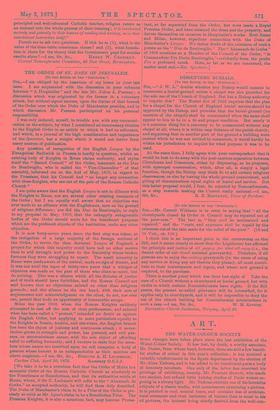THE ORDER OF ST. JOHN OF JERUSALEM.
[To THE EDITOR OF THE " SPECTATOR.1 SIR,—I am obliged by the insertion of my letter in your last issue. I am acquainted with the discussion in your columns between "A Hospitaller" and the late Mr. Julius A. Pearson ; a -discussion which was originated by the former in a voluntary attack, but without signal success, upon the claims of that branch -of the Order over which the Duke of Manchester presides, and in which discussion Mr. Pearson participated on his personal responsibility.
I was only induced, myself, to trouble you with any communi- cation on the subject, by what I considered an unnecessary allusion to the English Order in an article to which it had no reference, and which, in a journal of the high consideration and importance -of the Spectator, has a weight which it would not derive from many sources of publication.
Any question of recognition of the English Langue by the Evangelical Bailiwick in Prussia is hardly in question, whilst an existing body of Knights in Rome claims authority, and styles itself the "Sacred Council" of the Order, inasmuch as the Due -de Bentivoglio, who is called the " Vice-Chancellor " of that assembly, informed me on the 2nd of May, 1870, in regard to -the Prussians, that his Council had "no longer any connection with these,Knights, who :avoid of the pale of the Roman Catholic Church."
I am quite aware that the English Langue is not in alliance with -the Knights in Rome, nor are several other existing remnants of the Order ; but I am equally well aware that no objection was -ever made to an alliance with the Englishmen, save on the ground of religions difference ; nor did the Due de Bentivoglio, in reply to my proposal in May, 1870, that the unhappily antagonistic bodies of the Order should unite for the beneficent purposes which are the professed objects of the institution, make any other -objection.
It is now forty-seven years since the first step was taken, at the instigation of a large majority of the foreign sections of the Order, to revive the then dormant Longue of England, a project for which this majority could have had no other motive than to add strength and power to the fraternity whose broken -fortunes they were struggling to repair. The small minority in Rome were made aware of the revival, made no sign of dissent, and it was not until the lapse of thirty-two years that a whisper of -objection was made on the part of those who claim so much, but do nothing. This was a silence which all the dictates of justice and of truth should have forbidden, had the Roman Council not well known that no objections existed on other than religious grounds; and this silence on the one hand, with their acts of acquiescence and acknowledgment on the other, do not, nor ever -can, permit that body an opportunity of honourable escape.
Since the year 1858, when the Roman Knights suddenly attempted to cast off the acts of their predecessors, and entered what has been called a "protest," intended no doubt as against the English Order, but applying in main particulars equally to the Knights in Russia, Austria, and elsewhere, the English branch
-has been the object of jealousy and continuous attack ; it never- theless grows in strength and power, has pursued, and still pur- sues, an unostentatious career, with the sole object of affording relief to suffering humanity, and I venture to state that the mem- bers whose names are inscribed upon its roll comprise a body of persons whose honour is as unimpeachable as their motives are above suspicion.—I am, Sir, &c., EDMUND A. H. LECIIMERE, Carlton Club, April 30, 1873. Secretary 0.S.J.J.
[We take it to be a notorious fact that the Order of Malta is a monastic Order of the Roman Catholic Church as absolutely as the Franciscans or Benedictines, and that its authorities reside at Rome, where, if Sir E. Lechmere will refer to the " Almanach de Gotha," an accepted authority, he will find them duly described.
The Duke of Manchester's claim to be a Prior of the Order is pre- cisely as valid as Mr. Lyne's claim to be a Benedictine Prior. The Prussian Knights, it is also a notorious fact, may become Protes-
taut, so far separated from the Order, but were made a Royal Prussian Order, and have retained the dress and the property, and devote themselves on occasion to Hospitaller's works. Both Rome and Milan, however, repudiate connection with the Duke of Manchester's Langue. We rather doubt of the existence of such a person as the "Due de Bentivoglio." The" Almanach de Gotha" of 1866 mentions as a Member of the Council of the Order, " le Commandeur Fra Deal° Bentivoglio,"—evidently from the prefix Fra a professed monk. Here, so far as we are concerned, the matter must end.—En. Spectator.]


































 Previous page
Previous page